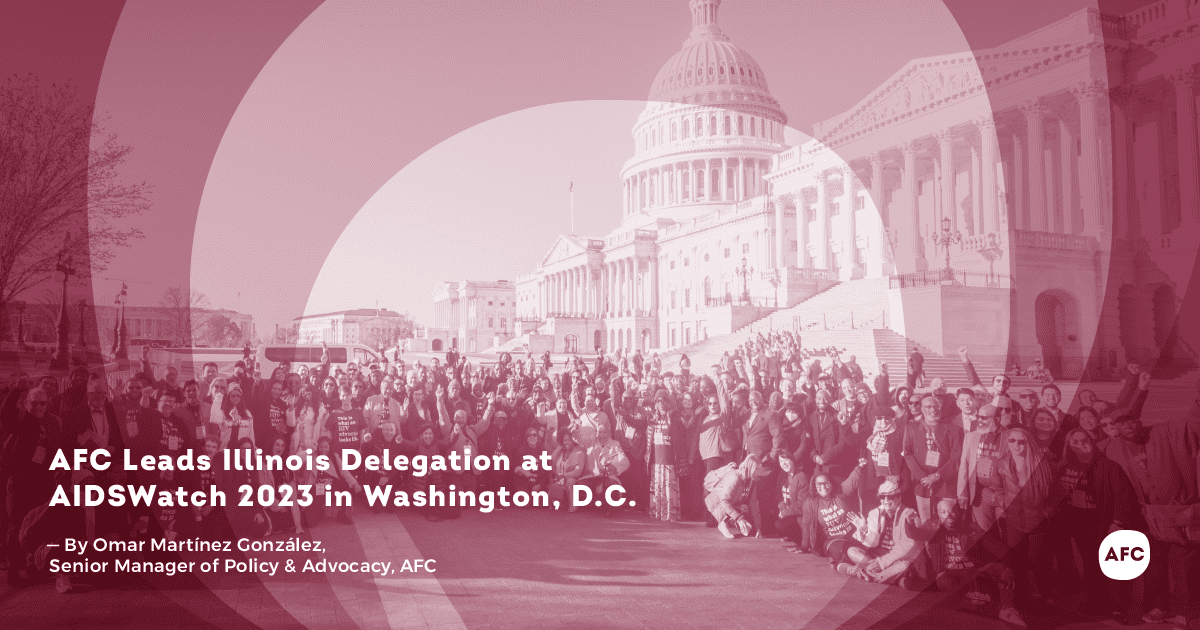The recently enacted (Exchange) Law calls for the creation of a 12-member Legislative Study Committee to issue a report to the General Assembly and the Governor on establishment of the Illinois Health Benefits Exchange.
As veto session for the Illinois State Legislature approaches next month, the AIDS Foundation of Chicago (AFC) has weighed in on the proposed . On October 5, 2011, AFC provided written comments on how Illinois can best implement an Exchange that will benefit healthcare providers, social service organizations, community residents, and individuals living with HIV/AIDS, who will be directly impacted by the Exchange.
Response to Draft Report by the Illinois Health Benefits Exchange Legislative Study Committee
October 6, 2011
The AIDS Foundation of Chicago (AFC) thanks members of this legislative study committee for undertaking the important task of reviewing and providing recommendations on how Illinois can best implement a Health Benefits Exchange. Thank you also to the staff who contributed towards the draft report and for providing expertise to this process.
AFC’s statewide membership, health care providers, social service organizations, community residents, and individuals living with HIV/AIDS will be directly impacted by the decisions of this study committee and by the enacting legislation to be considered by the General Assembly during the Fall 2011 veto session.
Governance
We reiterate our support for a quasi-governmental Exchange. AFC applauds the report recommendation that the board not include industry representative, brokers, or agents. While we agree with the recommended number (19) of board members, we believe legislators should be allowed on the board as non-voting members. While their expertise can be valuable to the work of the Exchange, we have concerns about conflicts of interest from legislators who have received campaign contributions from the insurance industry, the amount of time that they would have to devote to fully participate in meetings, and the perception among employers and consumers that the Exchange is an arm of the political parties.
To ensure that the Exchange meets the care and treatment needs of people living with HIV and AIDS, stakeholder consultation must include HIV/AIDS providers, consumers, and advocates. We recommend at least three individuals who represent communities of color to also serve on the Exchange board. These members can provide important perspectives to craft an Exchange that best serve these populations, which have higher rates of being uninsured and other barriers to health care.
Financing
We agree with the report that the state should leverage its Medicaid program to finance the Exchange administration– so by including Medicaid plans and providers, the state would be bringing in more federal dollars to support the Health Benefits Exchange.
Additionally, given that the Exchange and other health insurance reforms and regulations will encourage and require more people to purchase and enroll in health insurance programs, enrollment in private plans will increase substantially. Therefore, private plans both inside and outside the Exchange should share in the operational costs. Requiring all Illinois insurance health insurance carriers to help pay for the Exchange will ensure that carriers are not discouraged from participating in the Exchange.
Navigators
We support the Navigator Program, insofar as (1) it ensures that outreach is targeted to hard-to-reach and vulnerable populations (including people living with HIV and AIDS currently receiving care through the Ryan White Program); (2) it is conducted by people trained in low-income programs and working with diverse, hard-to-reach populations; (3) it is provided in a culturally and linguistically competent manner; and (4) it allows non-medical providers who are skilled in outreach and benefits coordination to serve as patient Navigators and to directly enroll individuals into the Exchange.
We recommend that the proposed findings/recommendations prohibit a Navigator from receiving compensation from health insurance issuers for enrolling individuals or employers in non-qualified health plans outside of the Exchange. Such a prohibition would discourage steering to plans outside the exchange.
In addition, the report should explicit state that Navigators should not be required to be licensed insurance brokers.
Additional Exchange Goal
We recommend the addition of a new Exchange goal that focuses on the needs of the Exchange’s ultimate customer, the consumer. While the current seven goals address competition, value, and other factors, consumers—real people who will buy actual health insurance—are barely mentioned. Goal four says, “Health insurers looking to their finances want to market their products to the largest group of consumers possible.” The only way to achieve that goal and others is to making the exchange friendly to consumers and make sure they have a good experience using the exchange, so the come back the next year. This goal should be explicit from the start, not an after-thought. Suggested language is below:
8. The Exchange should make it easy for every Illinoisan to choose a plan that meets their needs.
The power of the Exchange to increase competition and lower costs will be realized only if consumers can easily use the Exchange. The Exchange should be friendly to consumers and above all focused on providing good customer service. It should be written in plain English, accessible for people with disabilities, and available in other languages. Plans should have standard benefits so consumers are not presented with an array of hundreds of plans that all look the same.
Thank you for reviewing these recommendations. If you have any questions, please feel free to contact me at 312-334-0928 or at [email protected].
Sincerely,
Ramon Gardenhire
Director Government Affairs


